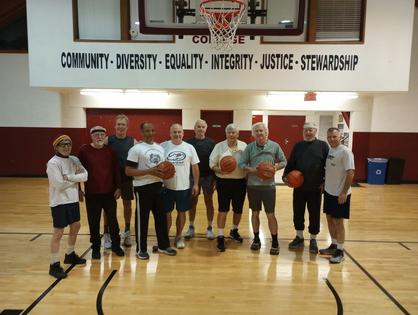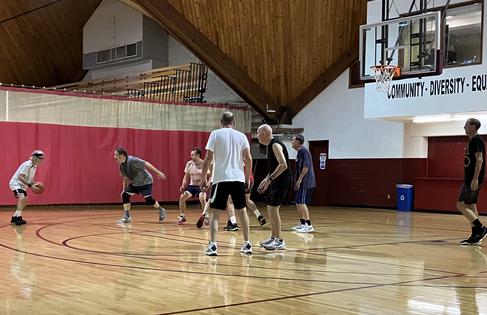‘The geezer game’ – a nearly 50-year-old pickup basketball game – reveals its secrets to longevity
Published in Political News
Donald Trump’s polarizing political rise in the past decade has driven many groups – and some families – apart.
But a long-running pickup basketball game that I play in, made up of people with various political leanings, including Trump supporters, remains intact. I explored the group’s dynamics in my 2020 memoir. In March 2025, we will celebrate its 50th anniversary.
As a former psychology professor who has written about the impact of participation in team sports, I think one of the secrets to our longevity is simple: We don’t talk politics.
Our semiweekly pickup game has seen several transformations. It started in 1975 as a faculty-student game at Guilford College, a small Quaker school in Greensboro, North Carolina. And we played in an old gym, known as the Crackerbox, once the home court of former NBA players Bob Kauffman, M.L. Carr and World B. Free.
Over the next 35 years, the game moved to a newer gym, went from half court to full court, and back to half court. Students and faculty moved on, while others joined the game, including many people from the Greensboro community.
As we aged, our game came to be known as “the geezer game.” These days, the average age of players is 64, with an age range from 32 to 79.
Since 1975, besides an 18-month stretch when we didn’t meet due to COVID-19 restrictions, the game took place three times a week before COVID-19 and has taken place twice a week since pandemic restrictions were lifted.
I believe we’ve lasted this long for several reasons.
From 1975 until about 2013, the game was co-ed, though usually with only one woman, a former colleague in the psychology department. With a Ph.D. from Yale, she was 6 feet tall, athletic and competitive.
More importantly, she brought a civilizing influence onto the court. It discouraged the guys from letting their macho tendencies take over. Because of her presence, and the occasional presence of other women, I think we were all less likely to behave abominably.
This phenomenon is well documented. As the scholar Gerard J. Degroot has shown, women’s social skills have a calming effect on groups of men. He told The New York Times the following regarding men in the military: “When female soldiers are present, the situation is closer to real life, and as a result men tend to behave. Any conflict where you have an all-male army, it’s like a holiday from reality. If you inject women into that situation, they do have a civilizing effect.”
Another secret to our longevity is bound to be the fact that everyone plays.
Many other pickup games keep winning groups of teams on the court and losers sit on the sidelines. But when we have extra people, we rotate them in every 10 points. If we have 14 players, we break into two games, one 4-on-4 and one 3-on-3. Because we don’t have to win to keep playing, this reduces the likelihood and intensity of disputes.
The author Thomas Beller has touched on this in his book “Lost in the Game: A Book About Basketball.” In it he writes: “The thing about these street games is that if you win, you play again. If you lose, you watch. Considering the time and effort involved in getting to the playground in the first place, there was a lot at stake in winning.”
Here’s another way we reduce conflict: Whenever we do have a dispute — was that a foul or a charge? — we call a jump ball and rotate possession. No need for long arguments that are never resolved.
We have not completely eliminated conflicts — we’ve had some skirmishes — but they are very rare. We have had our share of injuries, but very few have been caused by overly aggressive play.
A few months before we took our 18-month hiatus due to COVID-19, I wrote the book “Geezerball: North Carolina Basketball at its Eldest” based on what sociologists call a “participant observation” study of the game. Some people, especially my female colleague, served as important role models, I wrote in the book. And some rules that we implemented, like those that determined when new players entered the game and how we dealt with disputes, turned out to be important.
The game has survived the past decade because we don’t talk politics.
Whereas in other settings, and perhaps especially on college campuses, it might reduce divisions to share conflicting political viewpoints with others, we are there to play ball, not educate one another.
In the fall of 2016, there was some talk about the presidential campaign. One geezer, a die-hard Republican, admitted he didn’t like Trump. But, as he put it, “I could live with him.”
Another Republican player proudly proclaimed that he planned to spend Election Day driving Trump supporters to the polls.
Of course, Trump won, but many players, probably most, did not reveal their political views.
Because of COVID-19, we did not play during the 2020 election.
This past fall, unlike in 2016, there was virtually no talk about the election. But as someone who sees Trump as an authoritarian threat to democracy, to be honest, I don’t want to know if the guys I play with voted for him.
Avoiding politics, and specifically Trump, has allowed the game to continue without the animosity it might engender.
But the political climate has had its effects on the group off the court.
Before 2016, we had periodic geezer gatherings, sometimes with our spouses. We ate pizza, drank beer, gave out joke awards and celebrated birthdays. We enjoyed each other’s company. Though some smaller groups have continued to meet for lunch or to drink beer since, we are now less likely to gather socially.
It appears, then, that the larger communal spirit has been diminished by the polarized political world we now live in.
But the game goes on.
This article is republished from The Conversation, a nonprofit, independent news organization bringing you facts and trustworthy analysis to help you make sense of our complex world. It was written by: Richie Zweigenhaft, Guilford College
Read more:
What is a migrant? What is ICE? 10 terms to help you understand the debate over immigration
Overtime Elite – a private school, basketball league and media conglomerate – just sent two players to the NBA
Talking across the political aisle isn’t a cure-all - but it does help reduce hostility
Richie Zweigenhaft does not work for, consult, own shares in or receive funding from any company or organization that would benefit from this article, and has disclosed no relevant affiliations beyond their academic appointment.
































































Comments